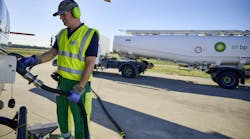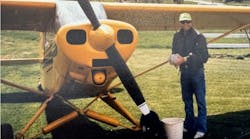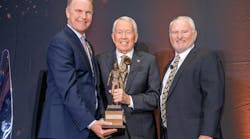The job of Worcester city manager can be as much about sales and marketing as it is about running a city, and long before sunrise on the cold morning of March 4, Michael V. O'Brien left his house ready to sell.
He was so focused on making the sale that morning that he didn't realize when the sale had been made.
After a 45-minute meeting with JetBlue executives at the airline's headquarters in New York City, Edward C. Freni, aviation director of the Massachusetts Port Authority, turned to Mr. O'Brien and said, "I think we have a deal."
"I pulled an Elaine from Seinfeld," the city manager said. "I pushed him in the chest and said `Shut the front door!'"
On the plane ride from Boston to New York, Mr. O'Brien, Mr. Freni, Massport Chief Financial Officer John P. Pranckevicius and Lt. Gov. Timothy P. Murray were optimistic - there was no reason not to be, given their previous interactions with JetBlue - but they didn't know they would shake hands on a deal that day.
JetBlue gave them two surprises: the airline agreed to launch service in Worcester, and it agreed to start flying a few months earlier than expected.
"We had focused on a November startup, and that's what we put on the table, and they committed," Mr. Freni said.
A month later, the chief executive of JetBlue Airways Corp. made the announcement before an enthusiastic crowd at Worcester Regional Airport. It was the culmination of an almost-two-year effort that involved people at every level - from ordinary citizens to high-ranking public officials, including a member of the Obama administration - to bring JetBlue to Worcester.
The very public courtship involved gestures as superficial as blue balloons and blue-sprinkled cookies, and as substantial as promises to waive fees and expenses.
JetBlue first signaled interest in Worcester back in 2000, but nothing came of it. The airport struggled through the next decade, losing four airlines, gaining then losing Allegiant Air, and gaining but later losing Direct Air.
Mr. Freni and David S. Mackey, Massport's interim CEO at the time, rekindled discussions about Worcester about two years ago. Most airlines were skeptical of the small airport. But Massport had a good relationship with JetBlue - the largest and fastest-growing carrier at Boston Logan International Airport - and used it to persuade the airline to take a hard look at Worcester.
At the time, Direct Air, a charter service, was flying from Worcester to a few southern destinations. But the company, in a financial tailspin, abruptly canceled flights in March 2012, leaving Worcester without air service - again.
"Right after Direct Air, that's when we really started to focus on JetBlue," Mr. Freni said.
Massport, which acquired Worcester Regional Airport from the city in 2010, invited JetBlue CEO David J. Barger to visit the airport. He did so, privately, in April. Then he tweeted about it.
The JetBlue campaign took a public turn. There were messages on Twitter and videos on YouTube, the latter sparked by a contest sponsored by local airport booster William Randell.
Even high-ranking government officials joined the effort.
Last summer, Mr. Barger received a phone call from Ray LaHood, the U.S. Secretary of Transportation. Mr. LaHood, fresh off a visit to Worcester, urged Mr. Barger to consider adding service to the city.
The Worcester visit and the phone call to JetBlue's CEO were done at the request of U.S. Rep. James P. McGovern, D-Worcester, who has known Mr. LaHood for two decades. They used to sit on the House transportation committee together.
"I wanted his help in getting things going," said Mr. McGovern, who has worked to secure federal funds for the airport, even when it was struggling to attract service. "After coming to Worcester, he agreed to make a phone call to JetBlue. He did it not just because I asked him, but because he was impressed Central Massachusetts, Worcester, really wanted the airport to work again."
Mr. Barger returned to Worcester in August. Mr. Pranckevicius, the Massport CFO and a Worcester resident, drove him around the city and showed him the many construction projects underway. At a public event later that day, Mr. Barger said "Worcester feels very JetBlue."
Massport, which spends the vast majority of its budget operating Logan, didn't forget about its smaller property. In the interview process that led to the appointment of Thomas P. Glynn as the agency's new CEO, board members brought up Worcester.
When Mr. Glynn assumed the role in November, he knew that bringing service back to Worcester would be among his top priorities. One of his early meetings was with Mr. Murray, an airport supporter who was also deeply involved in efforts to expand commuter rail service to the city through negotiations with CSX Corp.
"JetBlue, CSX, these different deals, you just stay at it," said Mr. Murray, a former Worcester mayor. "If you lay out the facts, you make a strong case, good, smart people are going to take a look."
In January, three top JetBlue executives toured Worcester and held a brief press conference in a small room at the Beechwood Hotel. As the event started, a loud chant broke out from a nearby room, where St. Vincent Hospital was having an unrelated meeting: "JetBlue! JetBlue! JetBlue!"
The airline would make a decision about Worcester by year's end, Martin J. St. George, JetBlue's senior vice president of marketing and commercial strategy, said that day. Privately, he and his colleagues told the city manager that the next time they came to Worcester, they'd bring a plane.
Negotiations continued. Mr. Freni, of Massport, was on the phone with the airline almost daily, talking logistics. "We just didn't want to lose that momentum from the August visit and the follow-up visit," he said. "We wanted to keep it fresh."
Mr. Freni, who formerly worked for American Airlines, had easy access to JetBlue's CEO. The two have known each other for decades, since their early years in the aviation industry. "I have his direct line, I have his cellphone," Mr. Freni noted. "We get along very, very well."
The next step came in March, when Mr. Freni, Mr. Pranckevicius, Mr. Murray and City Manager O'Brien decided to visit JetBlue's Queens, N.Y. offices. "I believe that was a strong signal of how much we wanted this to happen," Mr. O'Brien said.
They took a morning flight from Boston to New York. They toured JetBlue's offices before sitting down in a conference room, where Mr. Murray ticked off a list of Worcester's assets - the broad base of businesses, the thousands of college students - and Mr. O'Brien shared research about media outlets where JetBlue could buy ads to reach the public.
At the end of the meeting, they had a deal. The group from Massachusetts returned. There was no time for celebration that day, according to Mr. O'Brien, who said he had to be back in Worcester for an evening meeting.
The deal was kept secret as Massport, JetBlue and the city planned the surprise announcement for April 3. That morning, a JetBlue plane landed in Worcester.
Mr. Barger, with officials including Gov. Deval L. Patrick looking on, announced that JetBlue would begin daily flights to Orlando and Fort Lauderdale on Nov. 7.
Ultimately, JetBlue had to be convinced that Worcester could be a profitable market. The decision was influenced by the support expressed by residents, businesses and public officials.
"You just know when something feels right," Mr. Barger said at the Worcester announcement.
JetBlue's commitment came after Massport and the city made several promises to the airline. Massport agreed to waive landing fees and share marketing expenses, incentives that total $425,000. The agency is already spending $32 million on a project to upgrade landing systems at the Worcester airport. It also pledged to continue helping JetBlue at Logan.
"I don't think they would have wanted to take the risk on themselves," said Mr. Glynn, the Massport CEO. "This way, we kind of share the risk."
Massport has spent millions renovating a hangar and a terminal for JetBlue at Logan. The renovations will free more gates in Terminal C for JetBlue's use.
The city manager said he "offered all my services" to help JetBlue succeed in Worcester, primarily through marketing. Those efforts may involve taxpayer money, but first the city will apply for a federal grant, Mr. O'Brien said.
Mr. Glynn acknowledged that it's unusual for so many public officials to push one company to make a business decision like this. "But I think the view here is Worcester's the second-biggest city in New England, so we want to make sure, in terms of the economic agenda for the state, Worcester has all the assets available," Mr. Glynn said.
In a statement, a JetBlue spokeswoman said: "We are extremely grateful for the enthusiastic support from the Central Massachusetts community as well as from the local and state and even federal government. It means a great deal to have such a strong showing of support, which very much speaks to our ability to invest in service in Worcester and to our hopes for long-term success."
Public officials involved in the JetBlue deal noted that JetBlue ultimately had to make a purely business decision.
"Those of us in elected office, we can get people's attention," Mr. McGovern said. "But there's no way JetBlue would come to Worcester unless they believed they could succeed."
Contact Priyanka Dayal McCluskey at [email protected] Follow her on Twitter @Priyanka_Dayal.
Copyright 2013 Worcester Telegram & Gazette, Inc.All Rights Reserved



